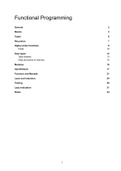Samenvatting
Summary Functional Programming (INFOFP)
- Instelling
- Universiteit Utrecht (UU)
All subjects that are discussed in the Functional Programming course, clearly summarized in a structured way. Based on the lectures and the book Programming in Haskell.
[Meer zien]





